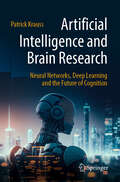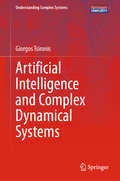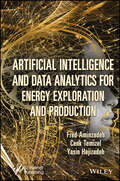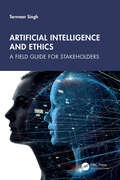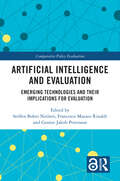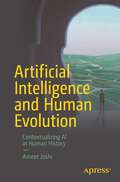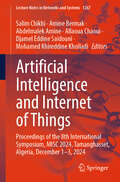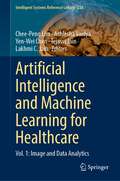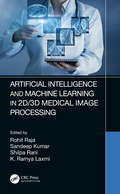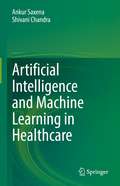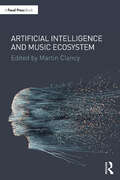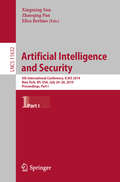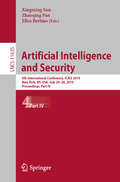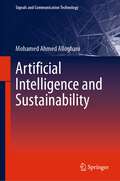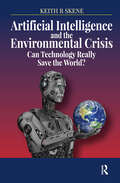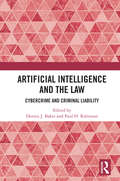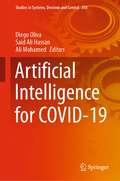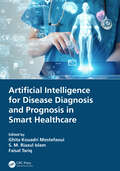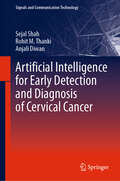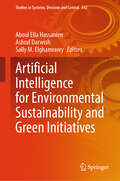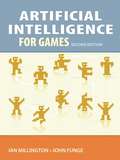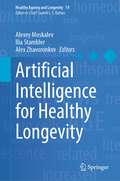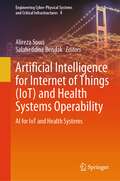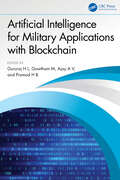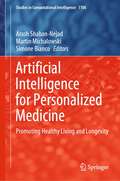- Table View
- List View
Artificial Intelligence and Brain Research: Neural Networks, Deep Learning and the Future of Cognition
by Patrick KraussHow does artificial intelligence (AI) work and are there parallels to the human brain? What do natural and artificial intelligence have in common, and what are the differences? Is the brain nothing more than a biological computer? What are neural networks and how can the term deep learning be explained simply?Since the cognitive revolution in the middle of the last century, AI and brain research have been closely intertwined. There have been several spectacular breakthroughs in the field of AI in recent years, from alphaGo to DALL-E 2 and ChatGPT, which were completely unthinkable until recently. However, researchers are already working on the innovations of tomorrow, such as hybrid machine learning or neuro-symbolic AI. But what does this actually mean?Based on current research findings and exciting practical examples, this non-fiction book provides an understandable introduction to the basics and challenges of these fascinating disciplines. You will learn what neuroscience and psychology know about how the brain works and how artificial intelligence works. You will also learn how AI has revolutionized our understanding of the brain and how findings from brain research are used in computer science to further develop AI algorithms. Discover the fascinating world of these two disciplines. Find out why artificial intelligence and brain research are two sides of the same coin and how they will shape our future.
Artificial Intelligence and Complex Dynamical Systems (Understanding Complex Systems)
by Giorgos TsironisThis book serves as a comprehensive introduction to nonlinear complex systems through the application of machine learning methods. Artificial intelligence (AI) has affected the foundations of scientific discovery, and can therefore lend itself to developing a better understanding of the unpredictable nature of complex dynamical systems and to predict their future evolution. Utilizing Python code, this book teaches and applies machine learning to topics such as chaotic dynamics and time-series analysis, solitons, breathers, chimeras, nonlinear localization, biomolecular dynamics, and wave propagation in the heart. The consistent integration of methods and models allow for readers to develop a necessary intuition on how to handle complexity through AI. This textbook contains a wealth of expository material, code, and example problems to support and organize academic coursework, allowing the technical nature of these areas of study to become highly accessible. Requiring only a basic background in mathematics and coding in Python, this book is an essential text for a wide array of advanced undergraduate or graduate students in the applied sciences interested in complex systems through the lens of machine learning.
Artificial Intelligence and Data Analytics for Energy Exploration and Production
by Fred Aminzadeh Cenk Temizel Yasin HajizadehARTIFICAL INTELLIGENCE AND DATA ANALYTICS FOR ENERGY EXPLORATION AND PRODUCTION This groundbreaking new book is written by some of the foremost authorities on the application of data science and artificial intelligence techniques in exploration and production in the energy industry, covering the most comprehensive and updated new processes, concepts, and practical applications in the field. The book provides an in-depth treatment of the foundations of Artificial Intelligence (AI) Machine Learning, and Data Analytics (DA). It also includes many of AI-DA applications in oil and gas reservoirs exploration, development, and production. The book covers the basic technical details on many tools used in “smart oil fields”. This includes topics such as pattern recognition, neural networks, fuzzy logic, evolutionary computing, expert systems, artificial intelligence machine learning, human-computer interface, natural language processing, data analytics and next-generation visualization. While theoretical details will be kept to the minimum, these topics are introduced from oil and gas applications viewpoints. In this volume, many case histories from the recent applications of intelligent data to a number of different oil and gas problems are highlighted. The applications cover a wide spectrum of practical problems from exploration to drilling and field development to production optimization, artificial lift, and secondary recovery. Also, the authors demonstrate the effectiveness of intelligent data analysis methods in dealing with many oil and gas problems requiring combining machine and human intelligence as well as dealing with linguistic and imprecise data and rules.
Artificial Intelligence and Ethics: A Field Guide for Stakeholders
by Tarnveer SinghArtificial Intelligence and Ethics is a general and wide-ranging survey of the benefits and ethical dilemmas of artificial intelligence (AI). The rise of AI and super-intelligent AI has created an urgent need to understand the many and varied ethical issues surrounding the technologies and applications of AI. This book lays a path towards the benefits and away from potential risks. It includes over thirty short chapters covering the widest array of topics from generative AI to superintelligence, from regulation to transparency, and from cybersecurity to risk management. Written by an award-winning Chief Information Security Officer (CISO) and experienced Technology Leader with two decades of industry experience, the book includes real-life examples and up-to-date references. The book will be of particular interest to business stakeholders, including executives, scientists, ethicists and policymakers, considering the complexities of AI and how to navigate these.
Artificial Intelligence and Evaluation: Emerging Technologies and Their Implications for Evaluation (Comparative Policy Evaluation)
by Steffen Bohni Nielsen, Francesco Mazzeo Rinaldi and Gustav Jakob PeterssonArtificial Intelligence and Evaluation: Emerging Technologies and Their Implications for Evaluation is a groundbreaking exploration of how the landscape of program evaluation will be redefined by artificial intelligence and other emerging digital technologies.In an era where digital technologies and artificial intelligence (AI) are rapidly evolving, this book presents a pivotal resource for evaluators navigating the transformative intersection of their practice and cutting-edge technology. Addressing the dual dimensions of how evaluations are conducted and what is evaluated, a roster of distinguished contributors illuminate the impact of AI on program evaluation methodologies. Offering a discerning overview of various digital technologies, their promises and perils, they carefully dissect the implications for evaluative processes and debate how evaluators must be equipped with the requisite skills to harness the full potential of AI tools. Further, the book includes a number of compelling use cases, demonstrating the tangible applications of AI in diverse evaluation scenarios. The use cases range from the application of GIS data to advanced text analytics. As such, this book provides evaluators with inspirational cases on how to apply AI in their practice as well as what pitfalls one must look out for.Artificial Intelligence and Evaluation is an indispensable guide for evaluators seeking to not only adapt to but thrive in the dynamic landscape of evaluation practices reshaped by the advent of artificial intelligence.The Open Access version of this book, available at http://www.taylorfrancis.com, has been made available under a Creative Commons Attribution-Non Commercial-No Derivatives 4.0 license.
Artificial Intelligence and Human Evolution: Contextualizing AI in Human History
by Ameet JoshiThis book explores, from a high level, the parallels between the evolution of humans and the evolution of machines. The book reviews practical questions about the future of AI but also engages in philosophical discussions about what machine intelligence could mean for the human experience.The book focuses on what is intelligence and what separates intelligent species from non-so-intelligent ones. It concludes this section with the description of true nature of humanintelligence can be. We discuss how we looked at machines few hundred years back and how their definition and the expectations from them has changed over time. We will consider when and how machines became intelligent and then explore in depth he latest developments in artificial intelligence with explanation of deep learning technology and humanlike chat interface provided with products like ChatGPT. We will define both human intelligence and artificial intelligence and the distinction between the two.In the third and final section of the book, we will focus on near- and longer-term futures with widespread use of machine intelligence, making the whole ambient environment that we will live in intelligent How is this going to change human lives, and what parts of human life will be encroached with machines and their intelligence? We will explore how the job market will look with some jobs being taken by machines, and if this is overall a positive or negative change. What You Will LearnHow human intelligence is connected with artificial intelligence as well as the differencesHow AI is going to change our lives in the coming years, decades and centuriesAn explanation of deep learning technology and humanlike chat interface provided with products like ChatGPTWho This Book is ForReaders looking to contextualize the evolution of artificial intelligence in human history
Artificial Intelligence and Internet of Things: Proceedings of the 8th International Symposium, MISC 2024, Tamanghasset, Algeria, December 1-3, 2024 (Lecture Notes in Networks and Systems #1267)
by Salim Chikhi Abdelmalek Amine Allaoua Chaoui Mohamed Khireddine Kholladi Djamel Eddine Saidouni Amine BermakThis book offers a cutting-edge exploration of key advancements in artificial intelligence, IoT, data science, and their transformative impact on industries, particularly health care, in a rapidly evolving technological landscape. Readers will discover how AI and machine learning drive innovations, from detecting anomalies in satellite systems to enhancing medical diagnostics and treatment precision. With a focus on real-world applications, the book delves into the integration of IoT systems and cloud computing to streamline business operations and improve efficiency. It also introduces groundbreaking data science techniques for analysis and prediction, making it a valuable resource for professionals, researchers, and students. Designed for those looking to understand and harness the power of modern technology, this book provides insights that are both practical and forward-looking, equipping readers to address today’s challenges and shape the future.
Artificial Intelligence and Machine Learning for Healthcare: Vol. 1: Image and Data Analytics (Intelligent Systems Reference Library #228)
by Lakhmi C. Jain Yen-Wei Chen Chee-Peng Lim Ashlesha Vaidya Tejasvi JainArtificial intelligence (AI) and machine learning (ML) have transformed many standard and conventional methods in undertaking health and well-being issues of humans. AL/ML-based systems and tools play a critical role in this digital and big data era to address a variety of medical and healthcare problems, improving treatments and quality of care for patients. This edition on AI and ML for healthcare consists of two volumes. The first presents selected AI and ML studies on medical imaging and healthcare data analytics, while the second unveils emerging methodologies and trends in AI and ML for delivering better medical treatments and healthcare services in the future.In this first volume, progresses in AI and ML technologies for medical image, video, and signal processing as well as health information and data analytics are presented. These selected studies offer readers theoretical and practical knowledge and ideas pertaining to recent advances in AI and ML for effective and efficient image and data analytics, leading to state-of-the-art AI and ML technologies for advancing the healthcare sector.
Artificial Intelligence and Machine Learning in 2D/3D Medical Image Processing
by Sandeep Kumar Rohit Raja Shilpa Rani K. Ramya LaxmiDigital images have several benefits, such as faster and inexpensive processing cost, easy storage and communication, immediate quality assessment, multiple copying while preserving quality, swift and economical reproduction, and adaptable manipulation. Digital medical images play a vital role in everyday life. Medical imaging is the process of producing visible images of inner structures of the body for scientific and medical study and treatment as well as a view of the function of interior tissues. This process pursues disorder identification and management. Medical imaging in 2D and 3D includes many techniques and operations such as image gaining, storage, presentation, and communication. The 2D and 3D images can be processed in multiple dimensions. Depending on the requirement of a specific problem, one must identify various features of 2D or 3D images while applying suitable algorithms. These image processing techniques began in the 1960s and were used in such fields as space, clinical purposes, the arts, and television image improvement. In the 1970s, with the development of computer systems, the cost of image processing was reduced and processes became faster. In the 2000s, image processing became quicker, inexpensive, and simpler. In the 2020s, image processing has become a more accurate, more efficient, and self-learning technology. This book highlights the framework of the robust and novel methods for medical image processing techniques in 2D and 3D. The chapters explore existing and emerging image challenges and opportunities in the medical field using various medical image processing techniques. The book discusses real-time applications for artificial intelligence and machine learning in medical image processing. The authors also discuss implementation strategies and future research directions for the design and application requirements of these systems. This book will benefit researchers in the medical image processing field as well as those looking to promote the mutual understanding of researchers within different disciplines that incorporate AI and machine learning. FEATURES Highlights the framework of robust and novel methods for medical image processing techniques Discusses implementation strategies and future research directions for the design and application requirements of medical imaging Examines real-time application needs Explores existing and emerging image challenges and opportunities in the medical field
Artificial Intelligence and Machine Learning in Healthcare
by Ankur Saxena Shivani ChandraThis book reviews the application of artificial intelligence and machine learning in healthcare. It discusses integrating the principles of computer science, life science, and statistics incorporated into statistical models using existing data, discovering patterns in data to extract the information, and predicting the changes and diseases based on this data and models. The initial chapters of the book cover the practical applications of artificial intelligence for disease prognosis & management. Further, the role of artificial intelligence and machine learning is discussed with reference to specific diseases like diabetes mellitus, cancer, mycobacterium tuberculosis, and Covid-19. The chapters provide working examples on how different types of healthcare data can be used to develop models and predict diseases using machine learning and artificial intelligence. The book also touches upon precision medicine, personalized medicine, and transfer learning, with the real examples. Further, it also discusses the use of machine learning and artificial intelligence for visualization, prediction, detection, and diagnosis of Covid -19. This book is a valuable source of information for programmers, healthcare professionals, and researchers interested in understanding the applications of artificial intelligence and machine learning in healthcare.
Artificial Intelligence and Music Ecosystem
by Martin ClancyArtificial Intelligence and Music Ecosystem highlights the opportunities and rewards associated with the application of AI in the creative arts. Featuring an array of voices, including interviews with Jacques Attali, Holly Herndon and Scott Cohen, this book offers interdisciplinary approaches to pressing ethical and technical questions associated with AI. Considering the perspectives of developers, students and artists, as well as the wider themes of law, ethics and philosophy, Artificial Intelligence and Music Ecosystem is an essential introduction for anyone interested in the impact of AI on music, including those studying and working in the creative arts.
Artificial Intelligence and Security: 5th International Conference, ICAIS 2019, New York, NY, USA, July 26-28, 2019, Proceedings, Part I (Lecture Notes in Computer Science #11632)
by Elisa Bertino Xingming Sun Zhaoqing PanThe 4-volume set LNCS 11632 until LNCS 11635 constitutes the refereed proceedings of the 5th International Conference on Artificial Intelligence and Security, ICAIS 2019, which was held in New York, USA, in July 2019. The conference was formerly called “International Conference on Cloud Computing and Security” with the acronym ICCCS.The total of 230 full papers presented in this 4-volume proceedings was carefully reviewed and selected from 1529 submissions. The papers were organized in topical sections as follows: Part I: cloud computing; Part II: artificial intelligence; big data; and cloud computing and security; Part III: cloud computing and security; information hiding; IoT security; multimedia forensics; and encryption and cybersecurity; Part IV: encryption and cybersecurity.
Artificial Intelligence and Security: 5th International Conference, ICAIS 2019, New York, NY, USA, July 26–28, 2019, Proceedings, Part IV (Lecture Notes in Computer Science #11635)
by Elisa Bertino Xingming Sun Zhaoqing PanThe 4-volume set LNCS 11632 until LNCS 11635 constitutes the refereed proceedings of the 5th International Conference on Artificial Intelligence and Security, ICAIS 2019, which was held in New York, USA, in July 2019. The conference was formerly called “International Conference on Cloud Computing and Security” with the acronym ICCCS.The total of 230 full papers presented in this 4-volume proceedings was carefully reviewed and selected from 1529 submissions. The papers were organized in topical sections as follows: Part I: cloud computing; Part II: artificial intelligence; big data; and cloud computing and security; Part III: cloud computing and security; information hiding; IoT security; multimedia forensics; and encryption and cybersecurity; Part IV: encryption and cybersecurity.
Artificial Intelligence and Sustainability (Signals and Communication Technology)
by Mohamed Ahmed AlloghaniThis book gives readers the tools to craft AI systems that don't just thrive today, but endure sustainably into the future. Whether a trailblazer or an aspiring innovator, this book enables readers to resonate with the ambitions of software developers, data scientists, and AI practitioners. The author covers the latest techniques and best practices for energy efficiency, reducing carbon footprints, and ensuring fair and ethical AI. The book also addresses important issues such as AI governance, managing risks, and ensuring transparency. Topics covered include understanding the relationship between AI and sustainable development, strategies for building efficient AI systems, and ethical considerations in AI development, among others. The author includes case studies of companies and organizations that have successfully implemented sustainable AI software development practices. Therefore, this book will be of interest to AI practitioners, academics, researchers, and lecturers in computer science, artificial intelligence, machine learning and data sciences.
Artificial Intelligence and the Environmental Crisis: Can Technology Really Save the World?
by Keith Ronald SkeneA radical and challenging book which argues that artificial intelligence needs a completely different set of foundations, based on ecological intelligence rather than human intelligence, if it is to deliver on the promise of a better world. This can usher in the greatest transformation in human history, an age of re-integration. Our very existence is dependent upon our context within the Earth System, and so, surely, artificial intelligence must also be grounded within this context, embracing emergence, interconnectedness and real-time feedback. We discover many positive outcomes across the societal, economic and environmental arenas and discuss how this transformation can be delivered.Key Features: Identifies a key weakness in current AI thinking, that threatens any hope of a better world. Highlights the importance of realizing that systems theory is an essential foundation for any technology that hopes to positively transform our world. Emphasizes the need for a radical new approach to AI, based on ecological systems. Explains why ecosystem intelligence, not human intelligence, offers the best framework for AI. Examines how this new approach will impact on the three arenas of society, environment and economics, ushering in a new age of re-integration.
Artificial Intelligence and the Law: Cybercrime and Criminal Liability
by Dennis J. Baker Paul H. RobinsonThis volume presents new research in artificial intelligence (AI) and Law with special reference to criminal justice. It brings together leading international experts including computer scientists, lawyers, judges and cyber-psychologists. The book examines some of the core problems that technology raises for criminal law ranging from privacy and data protection, to cyber-warfare, through to the theft of virtual property. Focusing on the West and China, the work considers the issue of AI and the Law in a comparative context presenting the research from a cross-jurisdictional and cross-disciplinary approach. As China becomes a global leader in AI and technology, the book provides an essential in-depth understanding of domestic laws in both Western jurisdictions and China on criminal liability for cybercrime. As such, it will be a valuable resource for academics and researchers working in the areas of AI, technology and criminal justice.
Artificial Intelligence for COVID-19 (Studies in Systems, Decision and Control #358)
by Diego Oliva Said Ali Hassan Ali MohamedThis book presents a compilation of the most recent implementation of artificial intelligence methods for solving different problems generated by the COVID-19. The problems addressed came from different fields and not only from medicine. The information contained in the book explores different areas of machine and deep learning, advanced image processing, computational intelligence, IoT, robotics and automation, optimization, mathematical modeling, neural networks, information technology, big data, data processing, data mining, and likewise. Moreover, the chapters include the theory and methodologies used to provide an overview of applying these tools to the useful contribution to help to face the emerging disaster. The book is primarily intended for researchers, decision makers, practitioners, and readers interested in these subject matters. The book is useful also as rich case studies and project proposals for postgraduate courses in those specializations.
Artificial Intelligence for Disease Diagnosis and Prognosis in Smart Healthcare
by Faisal Tariq Ghita Kouadri Mostefaoui Islam, S. M. RiazulArtificial Intelligence (AI) in general and machine learning (ML) and deep learning (DL) in particular and related digital technologies are a couple of fledging paradigms that next-generation healthcare services are sprinting towards. These digital technologies can transform various aspects of healthcare, leveraging advances in computing and communication power. With a new spectrum of business opportunities, AI-powered healthcare services will improve the lives of patients, their families, and societies. However, the application of AI in the healthcare field requires special attention given the direct implication with human life and well-being. Rapid progress in AI leads to the possibility of exploiting healthcare data for designing practical tools for automated diagnosis of chronic diseases such as dementia and diabetes. This book highlights the current research trends in applying AI models in various disease diagnoses and prognoses to provide enhanced healthcare solutions. The primary audience of the book are postgraduate students and researchers in the broad domain of healthcare technologies. Features In-depth coverage of the role of AI in smart healthcare Research guidelines for AI and data science researchers/practitioners interested in the healthcare sector Comprehensive coverage on security and privacy issues for AI in smart healthcare
Artificial Intelligence for Early Detection and Diagnosis of Cervical Cancer (Signals and Communication Technology)
by Rohit M. Thanki Sejal Shah Anjali DiwanThis book introduces the revolutionary use of AI in the field of cervical cancer detection. The book explores how advanced computer algorithms can analyze medical images and patient data to enhance early detection and accurate diagnosis of cervical cancer. The book starts by providing a comprehensive overview of cervical cancer, its risk factors, and the importance of early detection. It then delves into the fundamental concepts of artificial intelligence and its application in healthcare. Readers will gain a deeper understanding of how AI algorithms can "see" patterns in cervical cells and tissue, enabling the detection of abnormal cells and precancerous changes that may indicate the presence of cervical cancer. Drawing on the latest research and real-world case studies, the book showcases the various AI techniques used for cervical cancer screening, including the analysis of Pap smear and liquid-based cytology images. This book is an essential read for healthcare professionals, researchers, policymakers, and anyone interested in the intersection of AI and healthcare.
Artificial Intelligence for Environmental Sustainability and Green Initiatives (Studies in Systems, Decision and Control #542)
by Ashraf Darwish Aboul Ella Hassanien Sally M. ElghamrawyThis book discusses AI's applications in sustainability, exploring its potential in sectors such as energy, healthcare, agriculture, transportation, and waste management. Discusses applications and innovations in Green Initiatives such as energy, finance, and drug discovery. Highlights the ethical challenges and benefits of integrating AI into sustainability initiatives
Artificial Intelligence for Games
by Ian Millington John FungeCreating robust artificial intelligence is one of the greatest challenges for game developers, yet the commercial success of a game is often dependent upon the quality of the AI. In this book, Ian Millington brings extensive professional experience to the problem of improving the quality of AI in games. He describes numerous examples from real games and explores the underlying ideas through detailed case studies. He goes further to introduce many techniques little used by developers today. The book's associated web site contains a library of C++ source code and demonstration programs, and a complete commercial source code library of AI algorithms and techniques. "Artificial Intelligence for Games - 2nd edition" will be highly useful to academics teaching courses on game AI, in that it includes exercises with each chapter. It will also include new and expanded coverage of the following: AI-oriented gameplay; Behavior driven AI; Casual games (puzzle games).
Artificial Intelligence for Healthy Longevity (Healthy Ageing and Longevity #19)
by Alexey Moskalev Ilia Stambler Alex ZhavoronkovThis book reviews the state-of-the-art efforts to apply machine learning and AI methods for healthy aging and longevity research, diagnosis, and therapy development. The book examines the methods of machine learning and their application in the analysis of big medical data, medical images, the creation of algorithms for assessing biological age, and effectiveness of geroprotective medications.The promises and challenges of using AI to help achieve healthy longevity for the population are manifold. This volume, written by world-leading experts working at the intersection of AI and aging, provides a unique synergy of these two highly prominent fields and aims to create a balanced and comprehensive overview of the application methodology that can help achieve healthy longevity for the population.The book is accessible and valuable for specialists in AI and longevity research, as well as a wide readership, including gerontologists, geriatricians, medical specialists, and students from diverse fields, basic scientists, public and private research entities, and policy makers interested in potential intervention in degenerative aging processes using advanced computational tools.
Artificial Intelligence for Internet of Things: AI for IoT and Health Systems (Engineering Cyber-Physical Systems and Critical Infrastructures #8)
by Alireza Souri Salaheddine BendakIoTHIC-2023 is a multidisciplinary, peer-reviewed international conference on Internet of Things (IoT) and healthcare systems with Artificial Intelligence (AI) techniques such as data mining, machine learning, image processing, and meta-heuristic algorithms. The AI-based techniques are applied on many fields of healthcare systems, including predicting and detecting diseases in hospitals, clinics, smart health monitoring systems, surgery, medical services, and etc.
Artificial Intelligence for Military Applications with Blockchain
by Gowtham M Gururaj H L Ajay A V Pramod H BIn an era where advanced technology plays a critical role in maintaining national security, Artificial Intelligence for Military Applications with Blockchain investigates how combining AI and blockchain could transform military operations. This comprehensive guide offers creative answers for contemporary military problems while addressing the most important defense-related concerns, from data security to decision-making.It explores constrained networking middleware for defense applications, guaranteeing smooth communication under critical circumstances. This book starts with an in-depth examination of blockchain’s potential to improve document management across defense departments, then moves to a detailed discussion of security and privacy in military applications. The integration of AI and blockchain in military context is then the main topic of discussion, along with its advantages, disadvantages, and real-time applications.The potential of blockchain and AI to protect data and streamline operations is also explored, providing readers with insights into the military and healthcare sectors. This book offers a thorough examination of the military’s current and future use of AI, as well as a breakdown of cybersecurity issues and how blockchain technology is being used to improve military cybersecurity. A dedicated chapter examines the ways in which blockchain technology is being used by computational intelligence to transform the defense environment.Key features: Examines privacy and security issues in military blockchain applications Investigates military operations using constrained networking middleware Discusses integrating AI and blockchain technology for military applications Includes case studies of blockchain and AI uses in the military and healthcare Thoroughly examines cybersecurity issues and how blockchain technology can help This book is essential for military personnel, defense academics, and cybersecurity specialists interested in the use of AI and blockchain for defense. It presents real-world examples and case studies together with an outlook on how these technologies will influence future military operations.
Artificial Intelligence for Personalized Medicine: Promoting Healthy Living and Longevity (Studies in Computational Intelligence #1106)
by Simone Bianco Arash Shaban-Nejad Martin MichalowskiThis book aims to highlight the latest achievements in the use of AI in personalized medicine and healthcare delivery. The edited book contains selected papers presented at the 2023 Health Intelligence workshop, co-located with the Thirty-Seven Association for the Advancement of Artificial Intelligence (AAAI) conference, and presents an overview of the issues, challenges, and potentials in the field, along with new research results. This book provides information for researchers, students, industry professionals, clinicians, and public health agencies interested in the applications of AI in medicine and public health.
